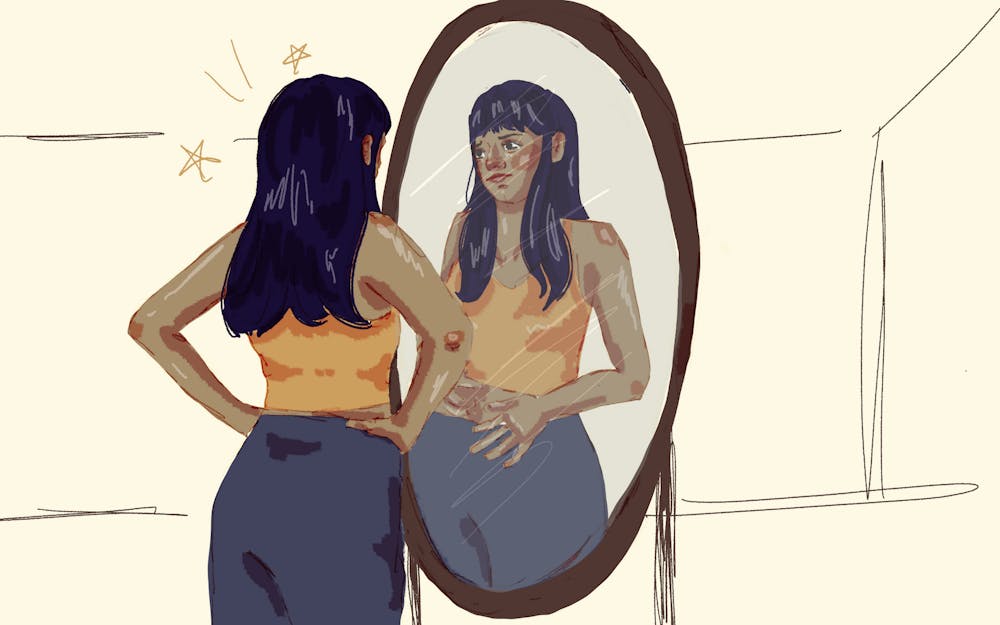I was shielded.
I grew up in a suburban neighborhood, where there was a neighborhood park, a fishing pond and backyard pools. As a child, I would ride my bike and run around the neighborhood with my friends and figured that this was something that most kids did.
I always felt safe.
Growing up, I was taught to be kind to everyone and not to judge anyone based on their appearance. My father is white, and my mother is Filipino. But I never looked at them or thought of them differently because of their skin color. I have tan skin, but in elementary school I always felt like I was like everyone else. White.
But then I started middle school, and that’s when it was pointed out to me that I wasn’t like everyone else. Then, again, in high school. And just when I thought it was over, it happened in college.
The “what are you?” questions started in middle school. Being one of the only Filipinos in my class, when it came time to learn about Asian countries in social studies class, I was put on display. One day, as I walked to the lunch line, boys in my grade flooded me with questions about if I was actually Filipino and what that was.
Being confident in my own skin went away around that time.
In high school, I was asked the same questions, but this time people just assumed I was Mexican and figured I could speak Spanish well. I became self-conscious in Spanish class.
When I started college, I told myself that I would start to be proud of who I am. But when I'm asked the same question or hear the same comments like “you looked like someone that would be good in Spanish,” the same insecure, uncomfortable, wanting to escape my own skin feeling came back.
[Related: COLUMN: Breaking Free: Three friends and a house]
I never truly understood how someone can assume one’s ethnicity or judge someone based on their skin color, but now I truly understand how deep this issue goes.
As an American Studies minor being taught in depth about the racism in America, it's been made clear to me why, in 2023, I’m still bombarded with the same thoughtless and ignorant questions and comments.
I recently just finished a book called “The Color of Law” by Richard Rothstein, for a class I’m taking for my minor called Racism and the Law. It goes into details about the segregated policies that were put into place in the 19th and 20th century that continued to “enslave” people of color financially and educationally.
It consisted of policies that enforced segregated housing, which led to segregated education, which led to segregated to jobs. This ensured that white people were superior. To this day, the law is still rooted in racism because, as Rothstein discussed in the book, you have to get rid of the old system and create a new one to be free of the ingrained racist laws.
For the same class, I’m currently reading a book called “Caste: The Origins of Our Discontents” by Isabel Wilkerson, which confronts the racial issues in the U.S. by looking at it as a caste system —not through wealth or education, but by one’s skin color. The lighter skin you have the more advantages and opportunities are given, while the darker skin you have the less advantages and opportunities are available.
I never looked at the racial indifferences in the country I live in as a caste system until now. But the new perspective isn’t a shock.
What’s sad is knowing that I wouldn’t have known in detail the root of these racial indifferences and issues if I didn’t put in the effort to be knowledgeable about it. Through school, the teachings of racism were briefly touched on and made it seem like it wasn’t an issue anymore. However, there are people in this country still experiencing the ripple effects of every policy that was put into place to make them inferior.
Some are quick to judge the “bad” parts of their city. As some people call it the “ghettos”. Which is a derogatory term used to refer to the area where usually minorities live. The area is usually more impoverished than others. But people don’t even realize that they were created and poorly sustained by white people to keep Black and Brown people inferior.
I will never be able to understand how it is to be a Black person in this country. But I can do my part to be educated on the topic.
I do understand, though, not feeling confident in my own skin. People looking at me wondering what I am. Kids in school assuming I don’t struggle in school because I’m half Asian. Going to the doctors for burning my hand on cooking oil and being told how it’s only a first-degree burn and I’m lucky to have the dark skin I have because I don’t burn easily.
Everyone in the U.S. need to take the initiative to learn about the raw history and issues in our own country and not rely on schools to teach us, because they are flawed themselves. We need to do our part to break this cycle of putting a bandaid on conflicts and start to attack it from the root of the issue — the laws.
[Related: COLUMN: Breaking Free: A tank full of gas and a car full of friends]
No one should have to feel uncomfortable in their own skin. Everyone should be able to feel proud about who they are and feel free of judgment and oppression.
Natalie Fitzgibbons (she/her) is a junior studying journalism with a minor in American studies. She hopes to inspire people with her words and make a positive impact in people’s lives and the world.






